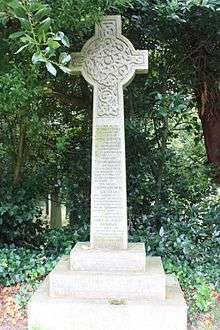David Anderson, Lord St Vigeans
David Anderson, Lord St Vigeans KC (26 October 1862 – 1 June 1948) was a Scottish advocate and judge. He served from 1918 to 1934 as the second Chairman of the Scottish Land Court.[1]
Early life

Anderson was born on 26 October 1862.[1] He was the son of Dr Joseph Anderson (1832–1916), an antiquarian who later served as keeper of the National Museum of Antiquities of Scotland from 1870 to 1913.[1][2]
Career
Anderson was called to the Scottish bar in 1891.[1] He was appointed as Sheriff of Dumfries and Galloway in March 1913,[3] and in June 1913 he became a King's Counsel.[1][4] In August 1917, he became Sheriff of Renfrew and Bute.[5]
In May 1918 he was appointed as Chairman of the Scottish Land Court, taking the judicial title of Lord St Vigeans.[1] The title was derived from the ancient village of St Vigeans in Forfarshire (now Angus), where his father had been educated.[6] He succeeded the deceased Lord Kennedy,[7] having twice served as temporary Chairman during periods of Kennedy's absence, in July 1914[8] and December 1915.[9]
After 16 years as Chairman, Kennedy submitted his resignation from the Land Court in early October 1934,[10] and retired from the bench on 1 November 1934. He was succeeded by Robert Macgregor Mitchell.[11][12]
In June 1935 he was awarded an honorary doctorate of Law by the University of Edinburgh.[13]
Personal life
In 1898 Kennedy married Emma Millar Robertson, daughter of James Robertson of Edinburgh. They had one son, James, who was killed in a motorcycle accident in 1922.[1]
Death
Anderson died in Edinburgh on 1 June 1948, aged 85.[1]
He is buried with his parents amongst the trees in the section north of the vaults in Warriston Cemetery.
References
- 1 2 3 4 5 6 7 8 "Lord St. Vigeans". The Times (Issue 51087). London, England. 2 June 1948. p. 6. Retrieved 3 January 2016 – via The Times Digital Archive. (subscription required (help)).
- ↑ Ritchie, Graham; Ritchie, Anna (1991). Scotland, Archaeology and Early History (2nd ed.). Edinburgh University Press. p. 9. ISBN 978-0748602919. Retrieved 3 January 2016.
- ↑ The Edinburgh Gazette: no. 12545. p. 282. 11 March 1913. Retrieved 3 January 2016.
- ↑ The Edinburgh Gazette: no. 12571. p. 613. 10 June 1913. Retrieved 3 January 2016.
- ↑ The Edinburgh Gazette: no. 13123. p. 1575. 3 August 1917. Retrieved 3 January 2016.
- ↑ "Lord St. Vigeans". The Times (Issue 41787). London, England. 11 May 1918. p. 3. Retrieved 3 January 2016 – via The Times Digital Archive. (subscription required (help)).
- ↑ The London Gazette: no. 30668. p. 5360. 3 May 1918. Retrieved 3 January 2016.
- ↑ The Edinburgh Gazette: no. 12684. p. 769. 7 July 1914. Retrieved 3 January 2016.
- ↑ The Edinburgh Gazette: no. 12882. p. 1882. 4 December 1915. Retrieved 3 January 2016.
- ↑ "Scottish Land Court". The Times (Issue 46874). London, England. 2 October 1934. p. 14. Retrieved 3 January 2016 – via The Times Digital Archive. (subscription required (help)).
- ↑ "News in Brief: Scottish Land Court". The Times (Issue 46899). London, England. 31 October 1934. p. 16. Retrieved 3 January 2016 – via The Times Digital Archive. (subscription required (help)).
- ↑ The Edinburgh Gazette: no. 15118. p. 901. 2 November 1934. Retrieved 3 January 2016.
- ↑ "University News". The Times (Issue 47103). London, England. 29 June 1935. p. 19. Retrieved 3 January 2016 – via The Times Digital Archive. (subscription required (help)).